The news in December
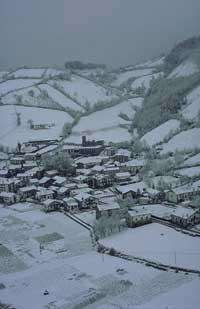
We are used to wearing many clothes to go out to the mountain, but despite having as many layers as onions, when it sounds the north can not remain motionless for a long time. Because the nose, the fingers... and the whole body when realized, cools and hardens.
After the autumn of much activity winter has come to us. Although for some animals it can be quieter, in general winter is hard for most. As far as humans are concerned, due to current clothing, modern heating systems, etc., few are afraid of winter, but this era, as for most animals, the hardest season for humans. I remember the sad phrase that a grandfather of our people threw in this tenor: "To see if after the winter we get to the spring" The challenge of the animals in the coming months will be to reach the spring.
Visitors to Iparralde
Although tourism offices believe that it is the time when most foreign visitors have in Euskal Herria. In fact, thousands of migratory birds travel our territory in search of food.
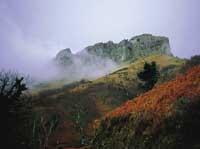
The Scandinavian chontes, the Polish colloquiums, the Scottish chargers and the Breton calf can be erected around the woods for two hours.
Someone might think that it is impossible to know where they are from and the truth is that it is not easy. However, through the rings that ornithologists put on birds, this is collected and much more information, and gradually the origin of birds that winter there is clarifying.
Eating Trash
If the stomach begins to sing, many species do not despise the most abundant food lately. Although there is no peace in the environment of human beings... as waste accumulates, many animals have learned very well to take advantage of the waste we generate. Thus, although not the most attractive places to visit, visiting the landfills can be enriching for fans of the beast, since they are ideal places to see rats, foxes, milanos, crows and especially seagulls grazing. Amiamoko zuri also exploits this food source and seems to explain, at least in part, the change in migratory habits of these birds. Unlike what happened in the past, some white storks remain in the Iberian peninsula itself without reaching Africa.
Cormorants in Bogotá
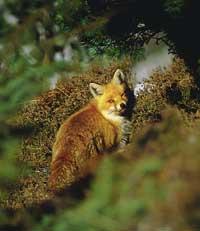
Although the fishermen do not want them too much, there are more and more herons and cormorants that come to our territory to spend the winter. In recent years, many people gather in the surroundings of Lasarte-Oria in the trees facing the motorway. Have they nothing better than this place full of cars and bustling? Who knows! However, they seem to like the place, as last year they could see more than 100 cormorants in the area of the Oria river almost every day. In any case, be attentive if you want to see them and, of course, look after leaving the car off the road, doing it on the highway is very dangerous.
Others in zeal
Human, (almost?) When spending the whole year in heat, it may be rare for other animals not to do so. However, in the rest of animal species the most normal thing is to have a relatively fixed time to reproduce. The wild boar has also just happened and the nails smell special. In order to cover the females, clashes can occur between the males and it is not uncommon that they have killed each other with the canines.
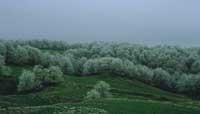
The vultures are also in heat. Elegant, during the bridal flight, the couple plans one over another circling over the sky, and at a given moment, the male up stretching the legs will try to touch the female that has under. Then, on one of the cliffs, the claws are copulated and put on a few days. Vultures, therefore, are the earliest of our birds when it comes to spawning, and some will do so by the middle of this month!
Desmán in the rivers
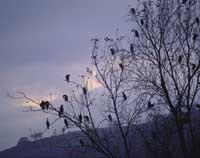
The Desmán del Pirineo is a curious mammal of rivers and clean streams from the Pyrenees to the Cantabrian mountain range. It resembles the mole, but unlike this, the tail is very long. It is a passionate hunter of aquatic invertebrates that, using the back palmate legs, has a great facility to find them in the rocky stretch of the river. Due to the small size of this mammal, it has great metabolic needs to maintain body temperature and has to hunt and devour. By winter, decreasing temperatures and increasing rivers make difficult times for these unknown mammals.
Keeping food for the winter
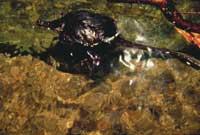
There are many species that keep food for the winter: bees, ants, grapefruits, squirrels, squirrels or even humans. Of course! Although not appreciated in the current way of life, until a few years ago in the hamlets were perfectly prepared with flour, chestnuts, honey, foods preserved in salt or oil, etc. It was traditional and continues to be killing this tenor. After the death of the pig, they prepared black pudding, txistorras, hams and hams to eat when needed. Today and since refrigerators and freezers are used, preserves of yesteryear have lost importance.
Hibernators sleeping
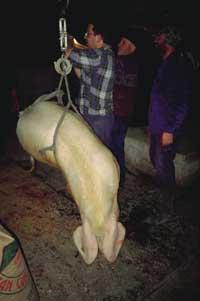
Shhhh! Do not scream, he is asleep! In a semi-covered hole, the lord of the jungles sleeps. Firm, thick, with an excellent coat, the bear has an excellent strategy to face the winter: hardly burn energy. So do lirones, marmots or bats. All these animals are hibernators and in late summer and late autumn the fat accumulated. At the same time, they began to prepare the winter hole (the groundhog formed a warm dry grass bed and the bears a comfortable horn chamber) and entered the pit shortly after winter.
Anyway, don't think it's easy to hibernate! In fact, very few hot blood species can do so. Hibernation decreases the level of metabolism, which implies profound changes: the heart rate and body temperature decrease and breathing slows down, thus maintaining a deep sleep until the arrival of spring. Until then sleep well and spend a good winter!
Buletina
Bidali zure helbide elektronikoa eta jaso asteroko buletina zure sarrera-ontzian








